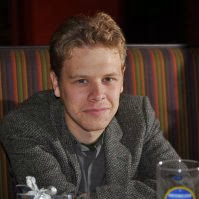As part of my winter break, I managed to read a book. Yes, one. If it weren't for a stubborn case of sinusitis I'd probably do more, but this one's a doozy anyway. Clocking in at nearly 900 pages, Anathem continues Stephenson's tradition of writing long books. This one, I can say, is worth it.
The conceit of the novel is that, in the world it takes place in, academics are cloistered in maths, which are essentially monasteries, except for academics instead of religion. The story follows Erasmas, a brother in one of these 'maths'.
The plot in the book is engrossing, and the world is well-built, if not a little bit disturbing. A lot of parallels are drawn regarding the way academia is treated in our world, and though it is clearly nothing as extreme as the case presented in the book, it does make you ask some questions as to what Stephenson is trying to say with this.
One thing to say is that Stephenson takes setting his book in an academic cloister seriously, and there's a lot of math, a lot of philosophy, and a fair amount of quantum physics. It makes the book harder to read, yes, but if you're willing to learn along, or have a decent academic background of any sort (I'm neither a physics nor a math major, but was able to keep up with most of the abstract concepts), it will greatly improve your ability to appreciate the book. I don't think you need to be extraordinarily educated to understand things the way Stephenson presents them, but you do need to be patient enough to understand the discussions the characters have on the subjects, possibly rereading them if need be (I did do this a few times, for this and a reason outlined below).
The one thing I find a little irksome in the book was Stephenson's vocabulary, notably the words he made up. For the most part, they add to the experience, and play in heavily towards the end of the book. So, it may have been worth the effort on Stephenson's part. There are 'dictionary' entries spread throughout the text as well as a glossary in the back, though some of these are still confusing. I went through most of the book with only some feeling as to what both 'Deolater' and 'Ita' meant, and both of these terms were fairly important.
All in all, the book was quite good, and kept me hooked for the two days I spent reading it. It is worth noting that reading a 900 page book in two days is not something I normally do, but for Stephenson, I'll put in the effort. After coming out deeply satisfied with this read, it may just be worth it to try the Baroque Cycle again. Maybe.
Sunday, December 28, 2008
Subscribe to:
Post Comments (Atom)

No comments:
Post a Comment